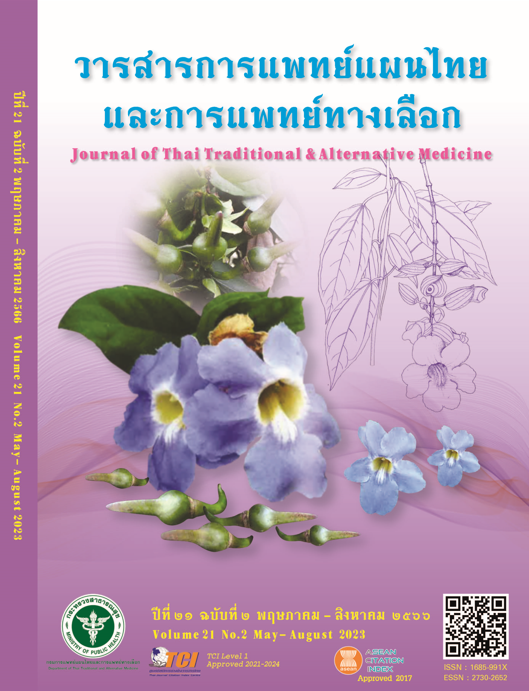Effect of Extraction Time of Kaeng Liang Paste on Cell Viability and Anti-inflammatory Activity by NF-kB Induction
Main Article Content
Abstract
Introduction and objective: The occurrence of emerging diseases has encouraged scientists to search for new drugs or methods as well as food supplements for health promotion, disease prevention, treatment and rehabilitation. Nowadays, herbs are one of the targets for drug discovery. This study aimed to explore the effect of extraction time of Kaeng Liang paste on its immunological activities, as determined by cell viability assay and the anti-inflammatory activity by NF-kB induction
Methods: Kaeng Liang paste extracts were obtained by decoction at 10, 20, and 30 minutes; and the determination of cell viability and anti-inflammatory activity by NF-kB induction of the extracts was performed.
Results: The three extracts of Kaeng Liang paste were capable of reducing cell viability and proliferation of macrophages. A consequence study about NF-kB induction indicated that there was a trend to reduce the release of inflammatory substance from macrophage in NF-kB pathway. This effect could be seen when they were up-regulated by PamCys3. Especially, the extract from 30-min decoction could decrease the function of NF-kB more than those from 10-min and 20-min decoctions and the untreated cells.
Discussion: Kaeng Liang is a Thai spicy-veggie soup, whose bioactivity studies have been conducted. It has previously been reported that it has anti-cancer activity. This study is part of a study on the immunomodulatory and anti-inflammatory activities of Thai curries. Previously, the amount of constituents in phenolics and flavonoids, and antioxidant activities of Thai food extracts such as Kaeng Liang, Papaya Salad, and Pad Kaphrao were studied. The results of this study confirmed the anti-inflammatory activities of pepper and shallots, which were the main ingredients of Kaeng Liang paste. It is suggested that further studies of the mechanism of anti-inflammatory activities should be undertaken.
Conclusion and recommendation: The study has confirmed the anti-inflammatory activity of shallot and pepper, the main ingredients of Kaeng Liang paste. Nevertheless, this study was conducted in vitro, further investigations on its anti-inflammatory activity in animals, pharmacological aspects and the mechanism of anti-inflammatory activities should be undertaken.
Article Details

This work is licensed under a Creative Commons Attribution-NonCommercial-NoDerivatives 4.0 International License.
References
Sitthichaiyakul P. Inflammation. [Internet]. 2020 [cited 28 Feb 2023]; Available from: http://www.med.nu.ac.th/pathology/405313/book54/Inflammation.pdf
Wirasorn K, Klarod K, Hongprapas P, Boonsiri P. Oxidative stress, antioxidant and cancer. Srinagarind Med J. 2014;29(2):207-19.
Bureau of Nutrition, Department of Health, Ministry of Public Health. Food supplement for immunity promotion for the elderly in the COVID-19 outbreak situation. Nonthaburi: Samcharernpanich (Bangkok) Ltd; 2020. 30 p. (in Thai)
Division of Pharmacy and Division of Thai traditional and alternative Medicine, Abhaibhubejhr hospital. Herbal food for immunity promotion in the COVID-19 outbreak situation. [Internet]. 2020 [cited 28 Feb 2023]; Available from: http://www.facebook.com/abhaiherb.center/ (in Thai)
Mair CE, Liu R, Atanasov AG, Schmidtke M. Antiviral and anti-proliferative in vitro activities of piperamides from black pepper. Planta Medica. 2016;82(S01):S1-381.
Couceiro JNDSS, Silva PMD, Santos MGMD, Ribeiro TS. Natural piperine as a new alternative against influenza viruses. VIRUS Reviews & Research. 2005;10:27-43.
Tiwari A, Mahadik RK, Gabhe SY. PIPERINE: A comprehensive review of methods of isolation, purification and biological properties. Medicine in Drug Discovery. [Internet]. 2020 [cited 21 Mar 2023];. Available from: https://doi.org/10.1016/j.medidd.2020.100027
Mohammadi-Motlagg HR, Mostafaie A, Mansouri K. Anticancer and anti-inflammatory activities of shallot (Allium ascalonicum) extract. Arch Med Sci. 2011;7(1):38-44.
Ssapin Disnil. Kang-Liang. [Internet]. 2020 [cited 19 Jan 2023]; Available from: แกงเลียง - บทความสุขภาพ โดยมูลนิธิหมอชาวบ้าน (doctor.or.th) (in Thai)
Boonpleng U, Temsiririrkkul R. Kang-Liang: Food is medicine. Faculty of Pharmacy, Mahidol University. [Internet]. 2020 [cited 15 Mar 2023]; Available from: https://pharmacy.mahidol.ac.th/th/knowledge/article/263/%E0%B9%81%E0%B8%81%E0%B8%87%E0%B9%80%E0%B8%A5%E0%B8%B5%E0%B8%A2%E0%B8%87%E0%B8%AD%E0%B8%B2%E0%B8%AB%E0%B8%B2%E0%B8%A3%E0%B9%80%E0%B8%9B%E0%B9%87%E0%B8%99%E0%B8%A2%E0%B8%B2/ (in Thai)
Assumption University of Thailand. Patent No. 13364 อสป/200-ข. [Internet]. 2020 [cited 12 Mar 2023]; Available from: https://repository.au.edu/handle/6623004553/21463 (in Thai)
Maiuthed A, Chanvorachote P. Cisplatin at sub-toxic levels mediates integrin switch in lung cancer cells. Anticancer Res. 2014 Dec;34(12):7111-7.
Neil M, Zeng DQ, Zeng X, Christopher M. Jewell. A poly (beta-amino ester) activates macrophages independent of NF-κB signaling. Acta Biomaterialia. 2018;(68):168-77.
Kesorn K, Maiuthed A, Suriyaphan O, Limwikrant W, Panyaphu D, Lomarat P. Determination of total phenolic and flavonoid contents in the extracts obtained from spices and herbs used in Thai recipes and their antioxidant activity. 38th International Annual Meeting in Pharmaceutical Sciences (IAMPS38). March 23-24, 2023; Pathumwan Princess Hotel, Bangkok. Faculty of Pharmaceutical Sciences, Chulalongkorn University; 2023. p. 96.
Charernkeratikul S. Potential of Thai recipes against cancer cells. Thai J Toxicology. 2009;24(2):29-38. (in Thai)


